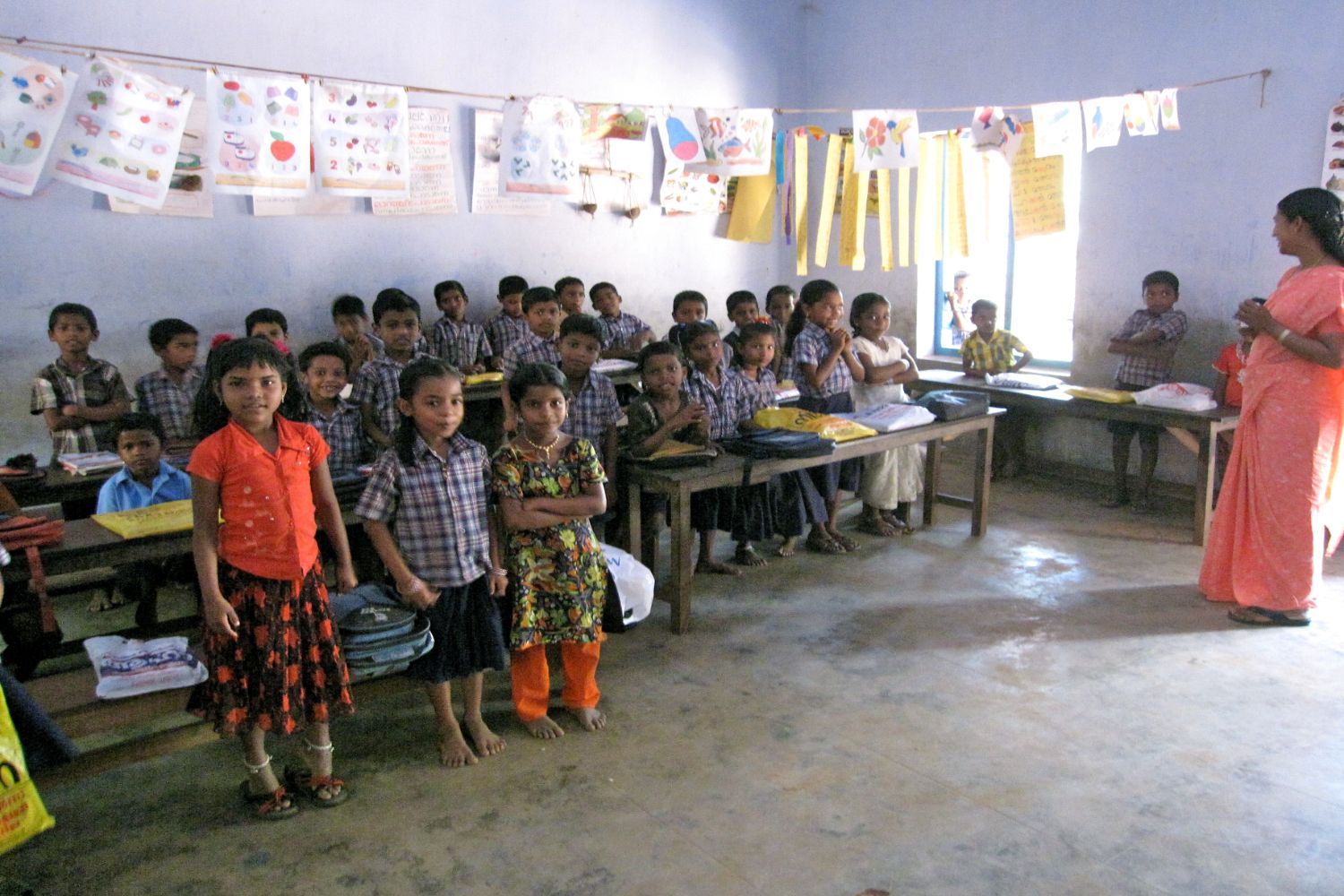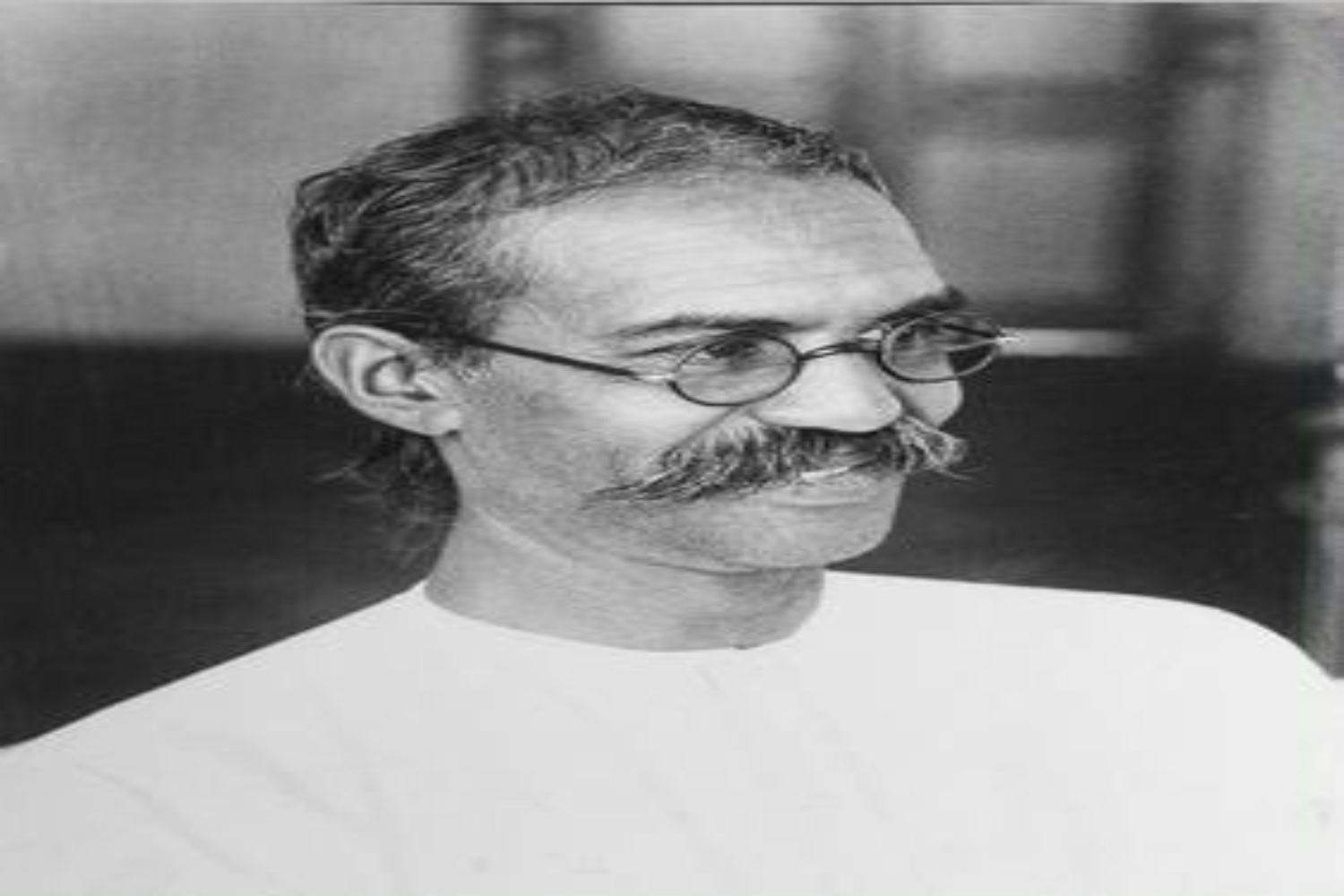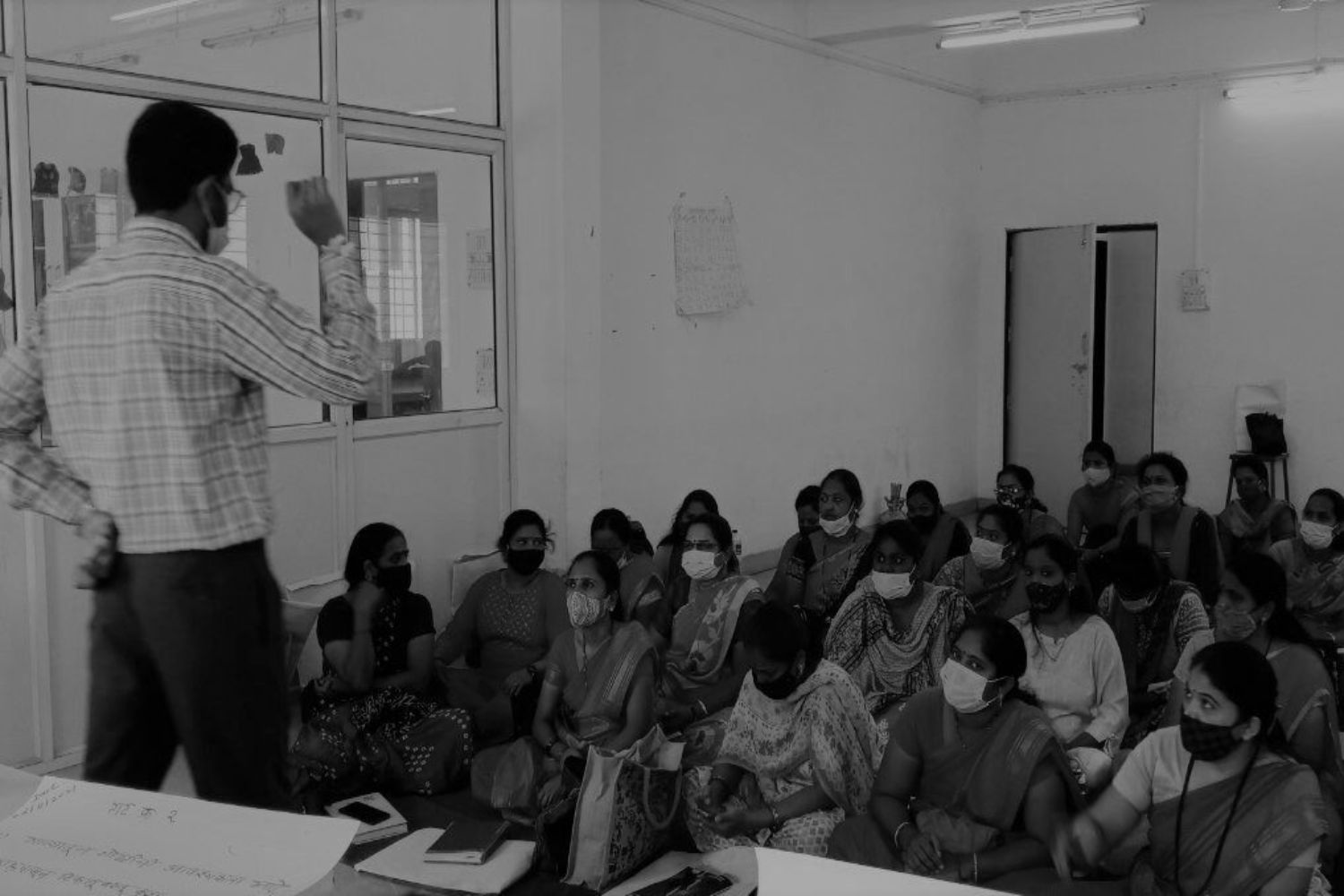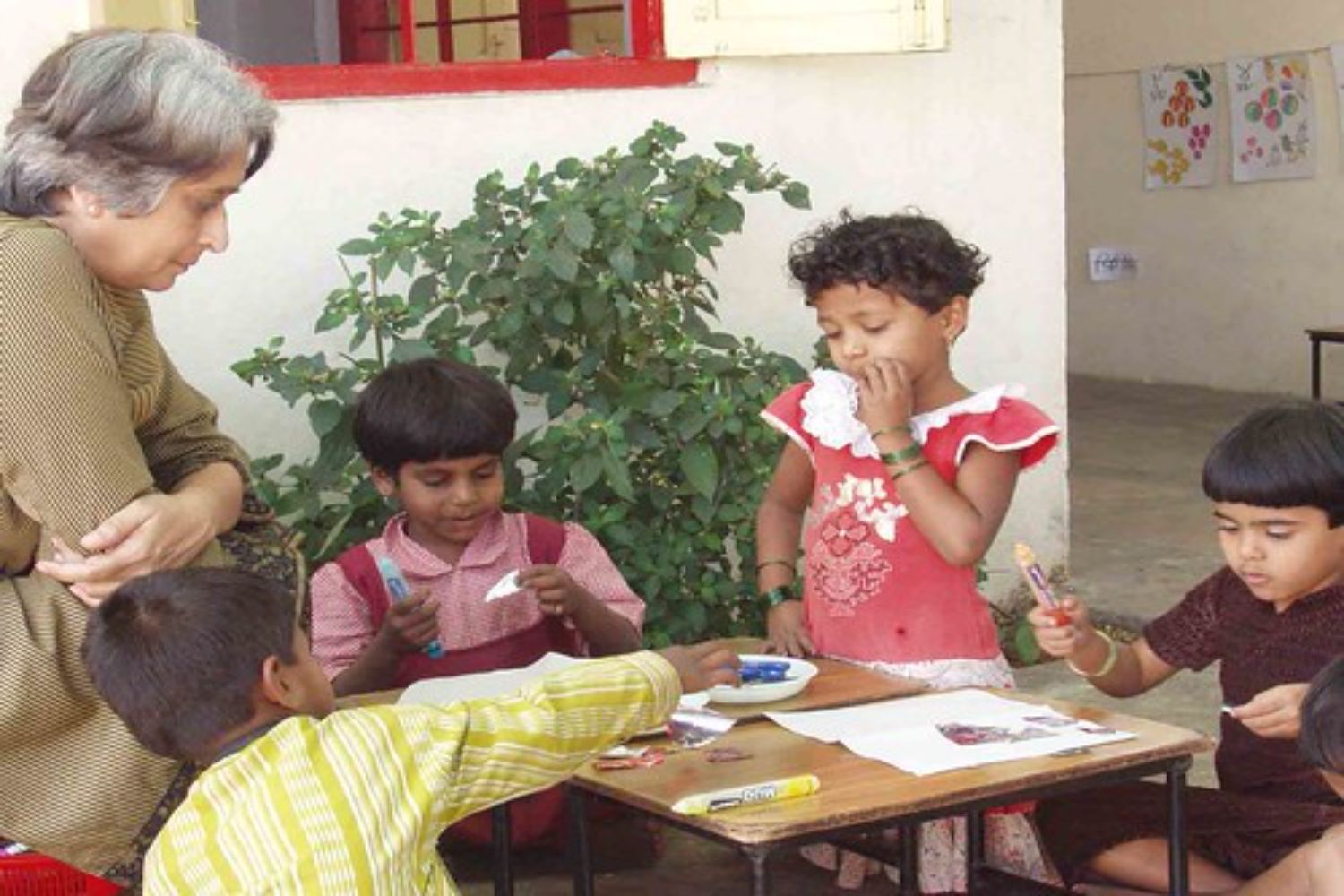NEP and developing programs for its effective implementation with special reference to ECCE
Sunisha Ahuja, in her essay, focuses on the need to develop programs for implementing NEP’s recommendations regarding ECCE on the ground, to ensure that the learning needs of the most underprivileged young children are met.

Background
National Education Policy (NEP) 2020 is India’s first education policy of the 21st century. It aims to address the many developmental priorities of the country. NEP has recommended the revision and revamping of all aspects of the education structure, starting with a new curricular structure that brings into its fold three years of pre-school education or early childhood education, by replacing the earlier 10+2 system with a 5+3+3+4.
The first five-years of schooling, referred to as the foundational stage, include three years of early childhood care and education (ECCE). NEP 2020 acknowledges that in this stage of schooling there should be a smooth transition for children from pre-school to early primary grades by ensuring that the curriculum is a continuum for children from age 3 to 8-years.
The policy lays particular emphasis on the development of the creative potential of everyone. It emphasizes that education must develop cognitive capacities, including ‘foundational capacities of literacy and numeracy,’ and higher-order cognitive capacities, such as critical thinking and problem solving. In addition, it also focuses on social, ethical and emotional capacities and dispositions.
NEP 2020 commits to ensure universal access to high quality ECCE across the country in a phased manner. It recommends Anganwadi centres and pre-primary sections in schools as platforms for delivering ECE within the government system.
Even earlier there have been efforts to institutionalize ECCE. NEP 1986 viewed ECCE as an important input in the strategy of human development and committed the state to give more attention to existing mechanisms of ECCE delivery. In 2013, Ministry of Women and Child Development passed the ECCE policy to be implemented through the wide network of Anganwadi centres.
In the last two decades, there have been legislative efforts that have put the spotlight on the need for and importance of early childhood education. In 2002, the government passed the 86th Constitutional Amendment, comprising two insertions: Article 21-A which made the Right to Education (RTE) of a child between six to 14 years, a fundamental right; and Article 51A(k) that assigned the ‘fundamental duty’ of educating a child to their parent or guardian.
Additionally, the old Article 45 was substituted by a new one through the same Constitutional Amendment, which introduced the concept of ECCE. It provided for a directive to the State, whereby the State was at liberty to pass legislation to bring into effect the mandate of providing ECCE to children up to six years of age.
The Right of Children to Free and Compulsory Education Act 2009 (or the RTE Act) was enacted with the primary objective to reiterate the aim of Article 21 of the Constitution. Section 11 of this Act gives legislative mandate to the respective Central and State governments to provide three years of ECCE to children below the age of 6 years, so that they enter schools with readiness for a more formal curricular transaction.
Vision for ECCE in NEP 2020 and its implication for programming in the states
The vision for ECCE programs, as mentioned in NEP 2020, is for children to attain optimal outcomes in the domains of physical and motor development, cognitive development, socio-emotional-ethical development, cultural/artistic development, and the development of communication and early language, literacy and numeracy.
Further the policy recommends that, “For universal access to ECCE, Anganwadi Centres will be strengthened with high-quality infrastructure, play equipment, and well-trained Anganwadi workers/teachers. Every Anganwadi will have a well-ventilated, well-designed, child-friendly and well-constructed building with an enriched learning environment.”
Children in Anganwadi Centres shall take activity-filled tours – and meet the teachers and students of their local primary schools, in order to make the transition from Anganwadi Centres to primary schools a smooth one. Anganwadis shall be fully integrated into school complexes/clusters, and Anganwadi children, parents, and teachers will be invited to attend and participate in school/school complex programs and vice versa.”
Recognizing the need for high quality professionally qualified adults to work with young children, NEP 2020 also recommends for courses for capacity building of existing human resource. A major departure was made by NEP 2020 from the existing National ECCE Policy 2013, by stating that the responsibility for ECCE curriculum and pedagogy would lie with the Ministry of Education to ensure its continuity from pre-primary school through primary school, and to ensure due attention to the foundational aspects of education.
The policy went on to state that the planning and implementation of the ECCE curriculum would be carried out by all relevant ministries implementing ECCE programs through their service delivery platforms, i.e., Anganwadi centres and pre-primary sections in schools.
Several states have taken the lead in translating the vision for ECCE as mentioned in NEP 2020. Coordination mechanisms have been established at the highest level of the administration between the Departments of Women and Child Development and School Education. Comprehensive five-year perspective plans have been developed through a consultative process to improve infrastructure of Anganwadi centres.
Review of existing ECCE curriculum in the states is being led by the Department of School Education. Learning materials for young children are being aligned to the goals of the National Mission for Foundational Literacy and Numeracy. Teams of resource persons and master trainers, with representation from both the departments are being formed at the district level to lead the capacity building programs for Anganwadi workers and schoolteachers. Online courses have been rolled out for the capacity building of Anganwadi workers. These focus on various programmatic aspects of ECCE.
Anganwadi workers and teachers are attending joint workshops. The goal is to help build trust, respect and empathy toward each other. Guidance has been developed for the engagement between Anganwadi centres and schools when Anganwadi centres are located within the school premises.
Many of these efforts of the state governments have been facilitated and supported by civil society organizations, through workshops, seminars, field visits and consultations with ECCE experts and academia. This is an ongoing exercise, as more and more guidance continues to be released from the national level. These discussions in the states are also leading to several innovative models of strengthening ECCE services at the Anganwadi centres.
States are setting up quality standards for service delivery, establishing norms for number of hours of daily program. They are also reaching out to communities to generate awareness on the need for and importance of play-based learning for young children. Efforts are being made to rebrand Anganwadi centres as learning centres through a recently launched campaign Poshan Bhi Padhai Bhi.
Some states are proposing to add an additional worker to the Anganwadi centre who would be only responsible for the ECCE program. In some states, teachers teaching in grade 1 and 2 are being asked to support Anganwadi workers in conducting pre-literacy and numeracy activities with 5-year-olds in the Anganwadi centre or be mentors and coaches for Anganwadi workers.
In several states, the Department of School Education has taken the lead in revising the existing ECCE curriculum through the SCERT. Many of these workshops are being attended by representatives from both School Education and Women and Child Development Departments.
All the recommendations of NEP 2020 are aligned to the developmental needs of children. However, some operational challenges have been identified while implementing these recommendations as it requires coordination and collaboration between different ministries and departments of the government at all levels of administration.

Support for ECCE program in Anganwadi centres and pre-primary sections of government schools
Provision of quality ECCE service to young children is on the concurrent list of the constitution. Both the Centre and the States can legislate on the subject. Both the Centre and the States have a legislative responsibility to define the quality standards for the services and provide the adequate funding required for implementing these.
Ministry of Women and Child Development and Ministry of Education at the national level, and their line departments in the States, are responsible for ensuring that all children 3-6-year-old have access to quality services through Anganwadi centres or preprimary sections of schools.
The Ministry of Women and Child Development, through its centrally-sponsored Mission Saksham Anganwadi, includes ECCE for children 3-6-year-old as one of the three primary program verticals, focusing on strengthening the early learning component of Anganwadi services, essential for children to achieve their full human potential.
It is being implemented through the State Governments/ UT administrations, based on a cost-sharing ratio between the Central and State Governments. For ECCE program, Rs.3,000/- per Anganwadi centre once in 5 year and Rs.1,000/- per Anganwadi centre per annum for four years has been provisioned. The ECCE program is supposed to be delivered by a multi-tasked Anganwadi worker supported by a helper, who are both paid a monthly honorarium. This amount varies across states with a minimum of Rs 4,500 per month to Rs.20,000 per month in some states/UTs.
The Ministry of Education, under its centrally-sponsored program Samagra Shiksha, has made provision for supporting ECCE in preprimary sections of government schools. Implemented by states governments /UT administrations, the financial investment is on a cost sharing basis. The components included under Samagra Shiksha Abhiyan are as follows.
- A grant of Rs 2 lakhs per annum to cover the cost of human resource, teaching learning materials per school per annum.
- Provision of up to Rs. 500 per child for teaching-learning materials, indigenous toys and games, play-based activities per annum for pre-primary sections in government schools.
- A non-recurring grant (one in five years) of up to Rs.1 lakh per school, for infrastructure improvement for including child friendly furniture, outdoor play materials, etc. for pre-primary sections in government schools and Anganwadi centres located within school premises.
Challenges that need to be addressed
Across the departments that are planning and implementing ECCE programs, there needs to be a common understanding that within a state there must be one common core curriculum for ECCE. While the School Education Department has the responsibility for developing the state ECCE curriculum, in many states the department has previously not implemented ECCE, as there were no pre-primary sections in schools.
On the other hand, the Department of Women and Child Development, after the release of the National ECCE Policy 2013, with support from several CSOs has designed and implemented a comprehensive ECCE curriculum. An effective leadership from both the departments needs to ensure that any efforts towards strengthening the ECCE program across implementation modalities must be done adopting a consultative approach involving all stakeholders.
Another area of concern that has emerged in some states in the development of the core ECCE curriculum is the downward shifting of learning expectations from children. This downward shifting of curriculum must be discouraged.
Efforts should be made toward sensitizing teachers and teacher educators to adopt play based teaching-learning practices adopted in ECCE programs to be the approach in early primary grades. This will ensure continuity in the pedagogical approach across the foundational stage.
A major requirement in implementing NEP 2020’s vision for ECCE is the need for a professional cadre for the ECCE workforce. The number of teacher education institutions offering programs preparing teachers for preschool is extremely low.
Only 1% of teacher education institutions in the private space (which comprise 92% of teacher education institutions in the country) offer programs for pre-school teachers. None of the north-eastern states have teacher education programs for pre-school.
In the case of the Anganwadi centres, the multitasked Anganwadi worker is expected to perform a wide variety of functions. There has not been sufficient investment in her professional development to deliver quality ECCE.
The Anganwadi system constitute the largest platform for implementing ECCE programs through its 13.9 lakh centres. There are around 1.88 lakh government primary schools with pre-primary sections, a number that has been increasing in the last few years. However, both the departments have diverse institutional ecosystems to support program delivery.
This includes supplies and infrastructure for education, institutional support for professional development and last but not the least, huge variation in financial investment. Coordination and collaboration between the two departments could lead to optimum utilization of the financial resources available currently, while continuous efforts are needed to enhance investment in programs for young children.
NEP 2020 is aspirational and directional. To meet the vision and goal of this policy, all stakeholders including government departments, civil society organizations, academia, elected representatives and the private sector need to come together for the common vision of giving young children in our country a good start in life to build strong foundations for all future learning.




No approved comments yet. Be the first to comment!